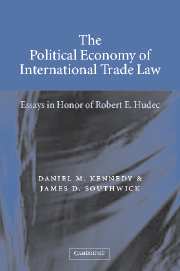Book contents
- Frontmatter
- Contents
- List of contributors
- Preface
- Foreword by E. THOMAS SULLIVAN
- Introduction: An overview of the volume
- Part I The constitutional developments of international trade law
- Part II The scope of international trade law: Adding new subjects and restructuring old ones
- 6 What subjects are suitable for WTO agreement?
- Comment: We have met the enemy and he is us
- 7 International action on bribery and corruption: Why the dog didn't bark in the WTO
- Comment: It's elementary, my dear Abbott
- 8 Alternative national merger standards and the prospects for international cooperation
- Comment: Harmonizing global merger standards
- 9 Agriculture on the way to firm international trading rules
- Part III Legal relations between developed and developing countries
- Part IV The operation of the WTO dispute settlement procedure
- Bibliography of works by ROBERT E. HUDEC
- Index
7 - International action on bribery and corruption: Why the dog didn't bark in the WTO
Published online by Cambridge University Press: 02 September 2009
- Frontmatter
- Contents
- List of contributors
- Preface
- Foreword by E. THOMAS SULLIVAN
- Introduction: An overview of the volume
- Part I The constitutional developments of international trade law
- Part II The scope of international trade law: Adding new subjects and restructuring old ones
- 6 What subjects are suitable for WTO agreement?
- Comment: We have met the enemy and he is us
- 7 International action on bribery and corruption: Why the dog didn't bark in the WTO
- Comment: It's elementary, my dear Abbott
- 8 Alternative national merger standards and the prospects for international cooperation
- Comment: Harmonizing global merger standards
- 9 Agriculture on the way to firm international trading rules
- Part III Legal relations between developed and developing countries
- Part IV The operation of the WTO dispute settlement procedure
- Bibliography of works by ROBERT E. HUDEC
- Index
Summary
Introduction
Throughout his scholarly career, Robert Hudec has made many important contributions to our understanding of international trade law. Yet none has been so important as his explication of the essential differences between “law” and “legal institutions” in the international trade system and their domestic counterparts. “International trade law” is a distinct institutional form adapted to the particular political context in which it has developed and is applied. Thus, in this volume we are enjoined to explore the political economy of international trade law: how national and international politics are intertwined with economic considerations in this unique set of institutions. We take that line of analysis one step further here by considering the relative effectiveness of alternative institutional arrangements in dealing with the politics of emerging issues on the international trade agenda.
A major premise of this paper is that one can learn much about the World Trade Organization (WTO) as a legal and political institution by considering the deeply political decision-making processes that determine which issues it will address and in what form it will address them. In other words, we focus here on the “legislative” side of the international trade system, which has received much less attention than the “judicial” side. We do so in terms of an expansive conception of international legalization – spanning the range from “soft” to “hard” law – which allows us to treat both political and legal factors.
- Type
- Chapter
- Information
- The Political Economy of International Trade LawEssays in Honor of Robert E. Hudec, pp. 177 - 204Publisher: Cambridge University PressPrint publication year: 2002
- 1
- Cited by

